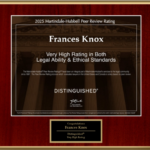Understanding the Legal Framework of Wrongful Death Claims in North Carolina
The loss of a loved one is a profound tragedy, and when this loss occurs due to another’s negligence or intentional actions, the legal process can feel overwhelming. Knox Law Center is dedicated to guiding families through the complexities of wrongful death claims in North Carolina. This article explores the legal definitions, eligibility criteria, timelines, and potential compensation under North Carolina law to help families navigate these challenges.
Defining Wrongful Death
Under North Carolina law, a wrongful death is defined as a death caused by the “wrongful act, neglect, or default of another,” which would have allowed the deceased to file a personal injury lawsuit had they survived (N.C. Gen. Stat. § 28A-18-2). The statute specifies that wrongful death actions are intended to hold responsible parties accountable for their conduct and to compensate the deceased’s estate and beneficiaries (North Carolina General Assembly, n.d.).
Eligibility to File a Wrongful Death Claim
In North Carolina, only the personal representative or executor of the deceased’s estate has the legal authority to file a wrongful death lawsuit (N.C. Gen. Stat. § 28A-18-2). This representative acts on behalf of the deceased’s beneficiaries, which may include immediate family members, dependents, or other parties entitled to inherit under the estate’s plan (Nolo, n.d.).
Statute of Limitations
North Carolina law requires wrongful death claims to be filed within two years of the deceased’s death (N.C. Gen. Stat. § 1-53(4)). This timeline is strictly enforced, and failure to adhere to it typically bars the claim from proceeding in court (Daggett Shuler Law, n.d.).
Establishing Liability
To succeed in a wrongful death case, the plaintiff must demonstrate the following elements:
- Negligence or Intentional Misconduct: Evidence that the defendant’s actions were negligent, reckless, or intentionally harmful.
- Breach of Duty: Proof that the defendant owed a duty of care to the deceased (e.g., a driver’s obligation to obey traffic laws).
- Causation: A direct link between the defendant’s breach of duty and the death.
- Damages: Tangible losses resulting from the death, such as medical bills or loss of companionship (N.C. Gen. Stat. § 28A-18-2).
Recoverable Damages
North Carolina permits the recovery of various damages in wrongful death cases, as outlined in N.C. Gen. Stat. § 28A-18-2. These include:
- Medical expenses incurred before death.
- Funeral and burial costs.
- Loss of the deceased’s income and earning potential.
- Loss of services, companionship, guidance, and support.
- Pain and suffering endured by the deceased prior to death (North Carolina General Assembly, n.d.).
Why Choose Knox Law Center
Navigating wrongful death claims requires both compassion and legal expertise. Knox Law Center is committed to providing personalized representation for families in Charlotte, NC, and surrounding areas. Our attorneys understand the emotional and financial toll of these cases and work diligently to secure justice and fair compensation for our clients.
Works Cited
- Daggett Shuler Law. (n.d.). Guide to wrongful death claims in North Carolina. Retrieved November 26, 2024, from https://daggettshulerlaw.com
- North Carolina General Assembly. (n.d.). General Statutes, Chapter 28A, Article 18: Wrongful death actions. Retrieved November 26, 2024, from https://www.ncleg.net
- Nolo. (n.d.). Wrongful death lawsuits in North Carolina: Who can file and what to expect. Retrieved November 26, 2024, from https://www.nolo.com






